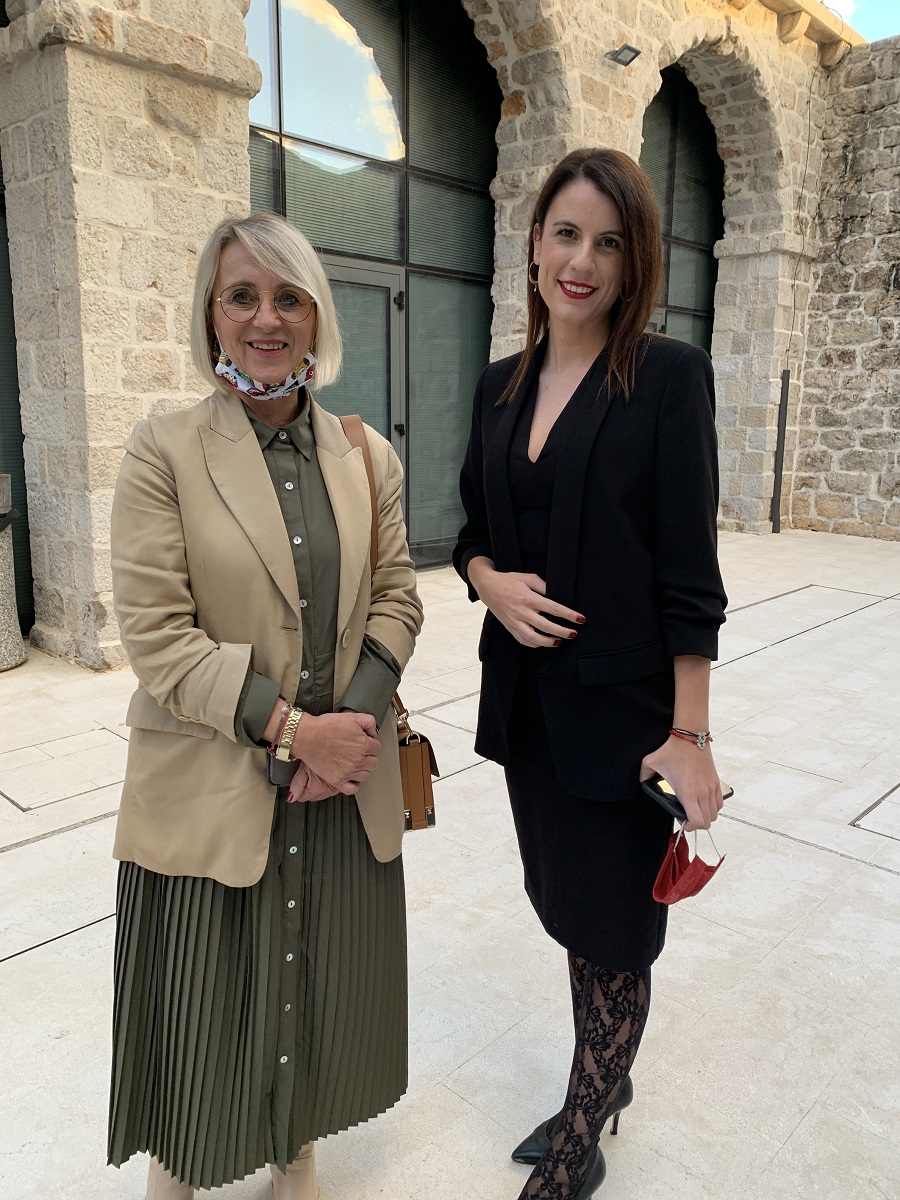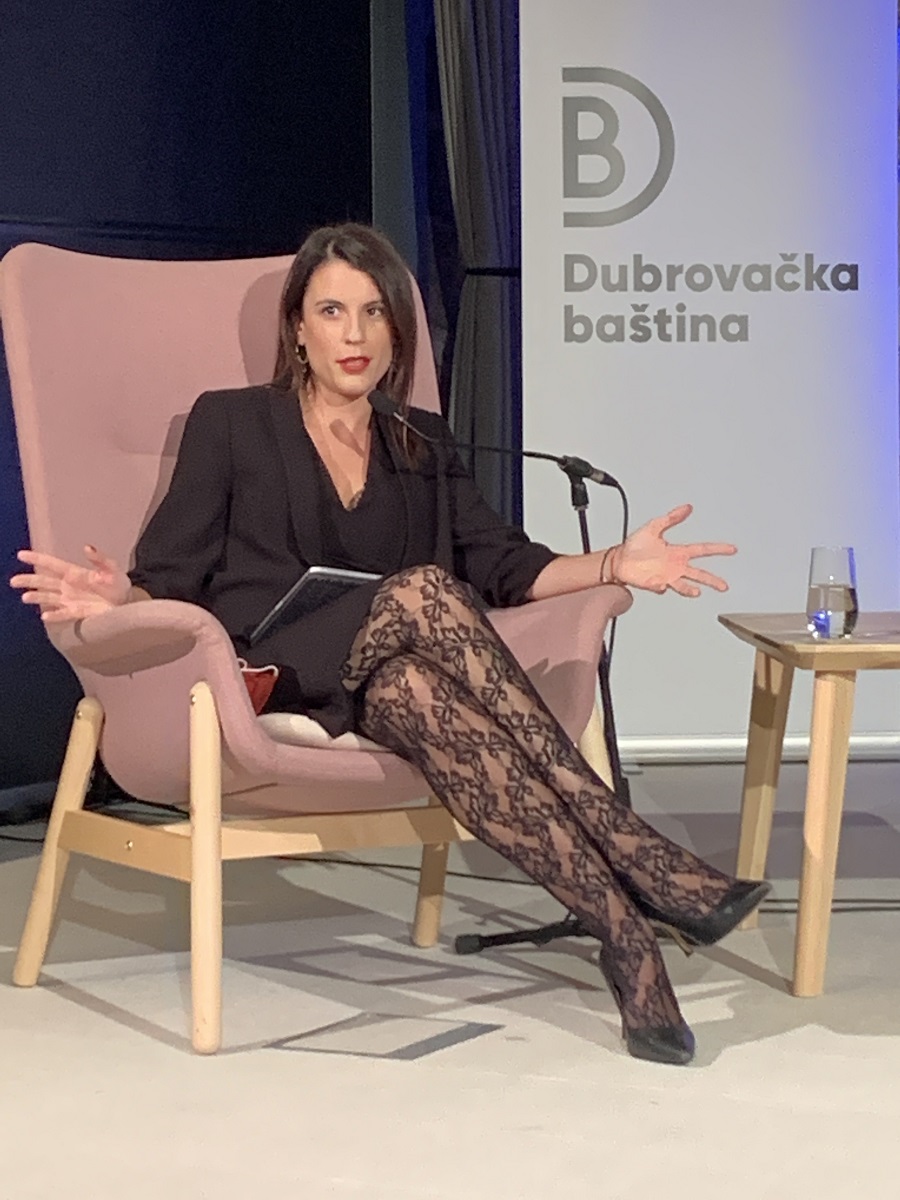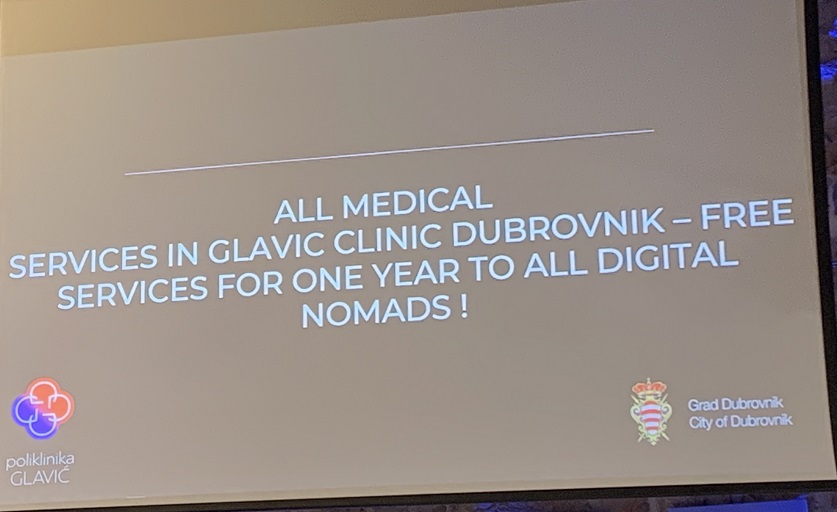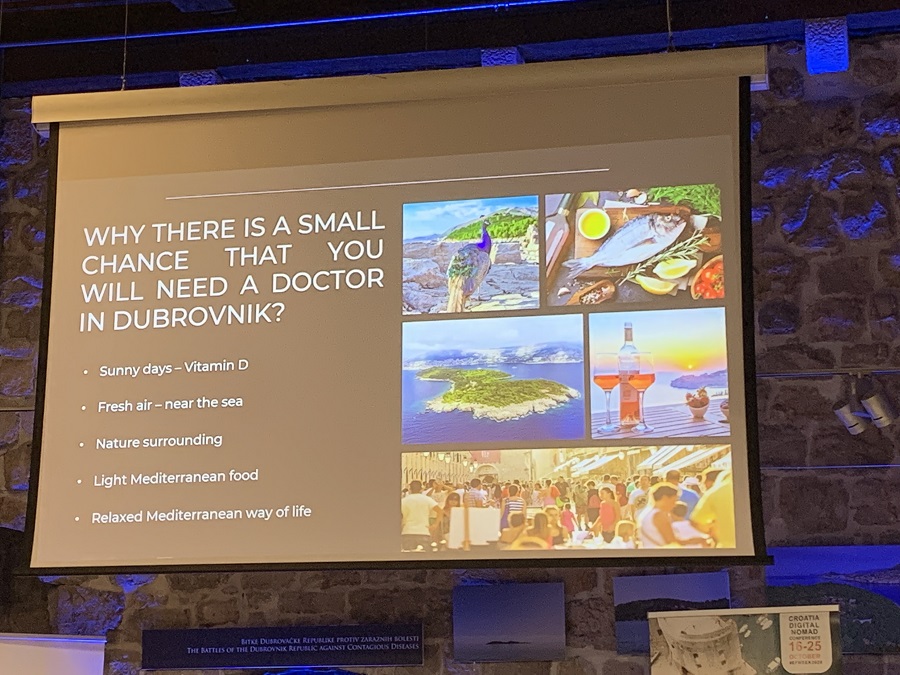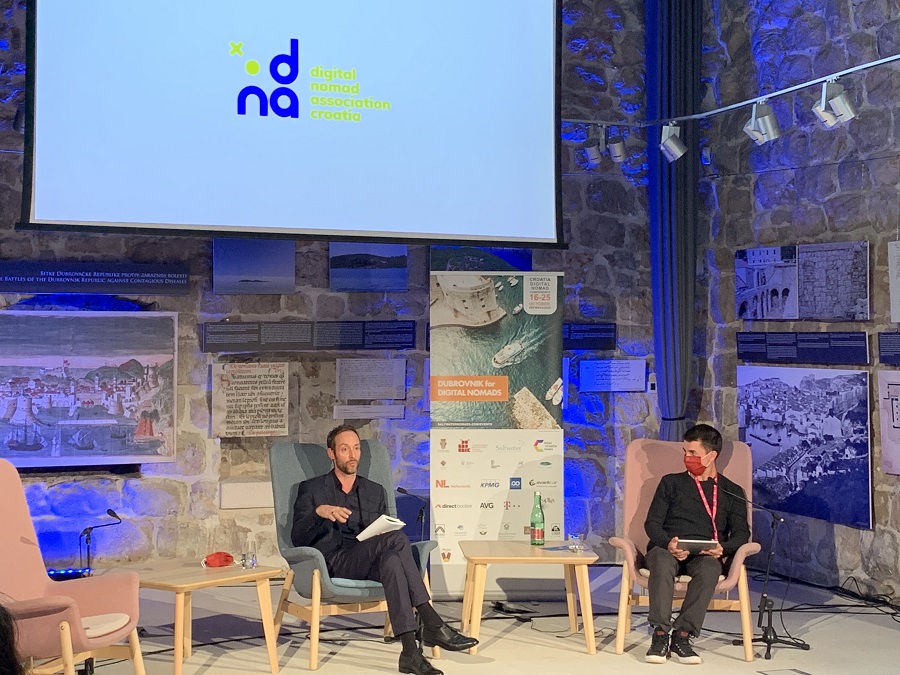Croatian Wine Envelope Funds for 2020 Almost Used Completely
As Morski writes on the 17th of October, 2020, as of October the 15th, 2020, another "wine" financial year ended. Out of the total available 10.8 million euros for 2020 within the National Wine Aid Programme, the Agency for Payments in Agriculture, Fisheries and Rural Development paid out 10.1 million euros to Croatian winemakers, which means that the percentage of Croatian wine envelope utilisation is higher than ever before, standing at almost 94 percent, reports the Ministry of Agriculture.
From the first programming period until now, the coverage has been expanded, ie the number of measures available to users of the Croatian wine envelope has significantly increased. The implementation framework and procedures have been simplified so that the approval and contracting process can be faster and easier. More specifically, in the new programming period, in addition to the existing three measures, a new measure of Information in EU member states was introduced, as was an upgrade of the existing Promotion measure on third country markets, with an aid intensity of 80 percent of the maximum eligible costs.
In the measure Restructuring and Conversion of vineyards, the aid intensity has been increased from the previous 50 percent up to 75 percent of the level of maximum eligible costs, the compensation of loss of income for vineyards has been introduced for a period of 3 years.
In the extremely challenging period of 2020 in which we're still knee deep, and due to the crisis caused by the COVID-19 pandemic, two new intervention measures were introduced: The Distillation of wine in crisis cases and Support for the crisis storage of wine, both of which are now nearing completion. At the same time in this period, due to special circumstances and disturbances caused by the pandemic, all measures were increased, as were their respective aid intensities. Despite all of the less than favourable circumstances, the new measures, the successful implementation of contracted projects and the processing of applications have contributed to the higher utilisation of the Croatian wine envelope when compared to all previous years.
Through the National Programme for Assistance to the Wine Sector, an annual fund of 11 million euros has been provided from the European Fund and the State Budget of the Republic of Croatia in the planned five-year programming period, ie a total of more than 55 million euros for development projects in the wine and viticulture sector.
For the latest travel info, bookmark our main travel info article, which is updated daily.
Read the Croatian Travel Update in your language - now available in 24 languages
Bakar Tourist Board Wins Prestigious Golden Interstas 2020 Award
As Morski writes on the 17th of October, 2020, the Bakar Tourist Board has won the prestigious international GOLDEN INTERSTAS 2020 tourist award, thus securing its place in the international club of meritorious tourism.
Encouraged by many years of effort and activities of the Bakar Tourist Board, and at the initiative of Mr. Sime Strikoman, the International Commission of Tourist Journalists proposed the candidacy of the Bakar Tourist Board for the prestigious international tourism award. The Bakar Tourist Board was clearly responsible for some highly creative professional achievements and excellence in the presentation of the richness of its tourism, traditional values and culture of Bakar despite all this year's problems with the ongoing coronavirus pandemic.
''We're extremely proud of winning the GOLDEN INTERSTAS 2020 award for excellence in tourism. This award is a great recognition to our entire team and a crown for all the effort and enthusiasm invested in everything we do, which ultimately led to winning this award. On this occasion, I'd like to thank all my associates who participated in the construction of our tourist story and who, with their dedication and professionalism, contributed to winning this valuable award, which is just a confirmation that when working with your heart, results can't be missed,'' said the director the Bakar Tourist Board, Sonja Jelusic Maric.
The 27th INTERSTAS / International Festival of Tourism, Tourist Film, Landscape - International Club of Meritorious for Tourism, will be held, in accordance with epidemiological measures introduced as a result of the pandemic on the 11th, 12th and 13th of November in Solin. The entire event, the presentation of the Laureates and accompanying events, is supported by FIJET, FEST, ITCO, AEFP, CiB / world and European associations in tourism, tourism journalism, film and landscape, under the auspices of the Split-Dalmatia County and of Solin, and under the high auspices of the Croatian Parliament and the President of the Republic of Croatia, Zoran Milanovic.
For the latest travel info, bookmark our main travel info article, which is updated daily.
Read the Croatian Travel Update in your language - now available in 24 languages
PM Says President Will Bring Into Question Purpose of His Office
ZAGREB, October 17, 2020 - PM Andrej Plenkovic has said that President Zoran Milanovic's activity contains elements of destabilisation, that he is minimising and downplaying the fight against coronavirus and social radicalisation and that if he continues acting like that, he will bring into question the purpose of his office.
Speaking to reporters after a meeting with HDZ members who are war veterans, Plenkovic said that the attack on the government building this past Monday was a criminal act with elements of terrorism and that the line had been crossed.
"I have no problem with anyone attacking me politically... I live with that, more than Milanovic does, for example for the past four years, as the prime minister who won elections twice and who beat Milanovic as well. Maybe that's why he is so nervous."
"He should understand as the president that speaking or writing against someone is not the same as coming to the government building with a machine-gun and pistol and committing a crime," Plenkovic said, stressing that people want peace and security and that they want economic problems to be dealt with.
Milanovic's narrative is identical to that of the left, Plenkovic said, adding that there is also the far right, which is characterised by exclusiveness, extremism and intolerance and which approves and has understanding for the attacker on the government building. In that context, he mentioned Homeland Movement leader Miroslav Skoro and the Bridge party.
He then pointed to his government's economic results, progress on the path to euro adoption and the fight against corruption.
If president goes on like this, he will bring into question purpose of his office
"Some may just have a big mouth, and some a lot of tasks to deal with. The way he (Milanovic) performs his duty, if he continues like this, he will bring into question the purpose of the institution of president. If we have an institution that stands in the way of serious processes, the fight against coronavirus, the fight against corruption and now the fight against radicalism, we may ask ourselves what its agenda is," he said.
Asked about responsibility for radicalisation in society, Plenkovic said that not everyone was responsible and that his HDZ party was committed to values of inclusiveness, tolerance, European values ad creation of a positive atmosphere in society.
"There are protagonists whose rhetoric incites hatred and intolerance, for example when someone says that they are against the Croat-Serb trading coalition or that cooperation between the ruling party and representatives of ethnic minorities, including the Serb minority, is unacceptable," he said, noting that a part of the left political scene, including the president, and left pundits do not want to recognise his party's evident transformation.
Plenkovic said that he wanted a Croatia that is not radical or intolerant or against ethnic minorities being part of the parliamentary majority.
As for Milanovic's statement that Plenkovic did not know anything about the investigation into the JANAF corruption case and knew everything about the investigation into the attack on the government building, Plenkovic said that those were two entirely different things.
He added that preliminary investigations into corruption cases were not a matter of national security and that police and prosecutors worked on them without any interference from the government.
As for the attack on the government building, he said that it had to be established if the perpetrator had been under someone's influence, if someone had helped him and if there were other such potential assailants. A political battle has to be launched to erect a cordon sanitaire around political parties that condone or have understanding for crimes such as Monday's attack, he said.
That is not fear, the line has been crossed, he reiterated.
Asked about his security having been stepped up, Plenkovic said it was a matter of police assessment but he confirmed having received threats.
Plenkovic arrived for the meeting with HDZ war veterans in a bullet-proof limousine.
He also said that he did not intend to meet with Milanovic because he did not see how a person downplaying coronavirus and radicalisation of society could be of help.
Croatian Fis Paprikas Listed Among Top 100 Traditional Dishes in the World!
October 17, 2020 – Food guide TasteAtlas published the list of the best traditional dishes in the world and Croatian fis paprikas is the only Croatian dish that made it to the top 100.
As TasteAtlas announces, the day of the local food celebration has come! The list of the top 100 traditional dishes in the world for 2020 has been published, and this year, Croatia can boast one specialty that made it to the list – fiš paprikaš (fish stew), which took 90th place among the great competition of world-famous specialties, such as Japanese sushi, Israeli falafel, and Spanish paella.
This traditional specialty comes from the eastern part of Croatia, from the regions of Baranja and Slavonia, and is influenced by neighboring Hungary. Their popular dish called paprikás csirke (chicken stew) also made the list, taking only two places ahead of Croatian fiš paprikaš.
"Fiš paprikaš (or hal paprikas in Hungary) is a traditional stew cooked in a big cauldron over an open fire. This spicy fish stew is traditionally made with a variety of freshwater fish such as catfish, starlet, pike, and carp. The stew is heavily flavored with large amounts of the region's staple – ground red paprika, which can range from mild to very hot. Fiš paprikaš is often served with homemade noodles, and it is so popular in the region that there are numerous fiš cooking competitions organized throughout the year. The dish is traditionally accompanied by hot ground paprika on the side so each person can increase the spiciness according to personal preferences," reads the description of fiš paprikaš on TasteAtlas.
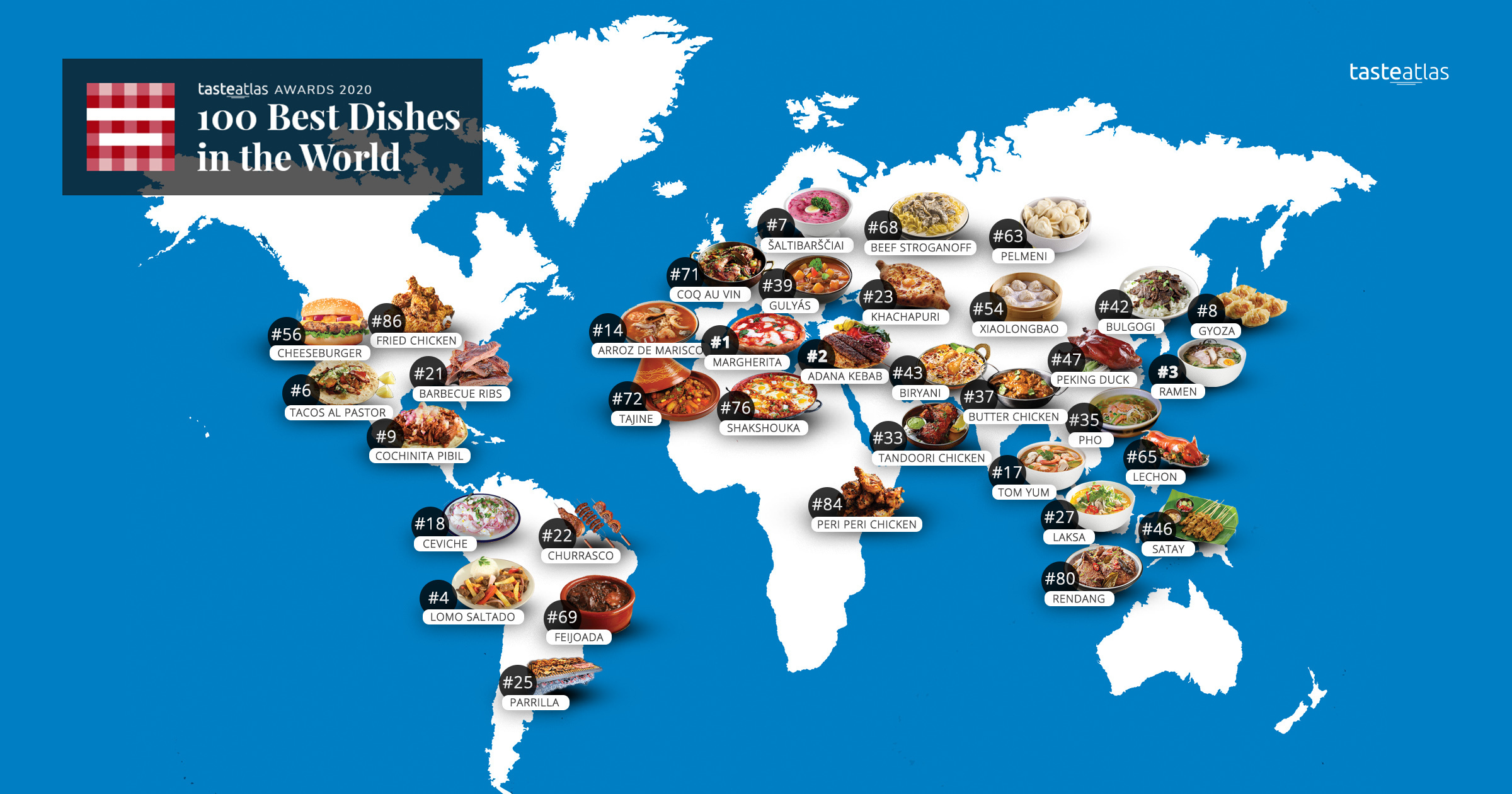
The map of the best traditional dishes in the world / Source: TasteAtlas
However, this is not the first time TasteAtlast recognized the quality of fiš paprikaš. It took the 3rd place on the list of most popular freshwater fish dishes in the world. It is also included on the list of most popular fish dishes in the world where it stands in 30th place. On the list of most popular seafood in the world, it comes in 82nd place, and it is 96th place on the list of most popular stews in the world.
Considering the most popular Croatian fish dishes and seafood, it takes 2nd place, along with other fish specialties from Baranja and Slavonia, namely, pijani šaran (drunken carp) and perklet od soma, likewise influenced by Hungary.
TasteAtlas traditional food awards 2020 listed the top 100 world-famous dishes according to 63,402 valid ratings on TasteAtlas, along with the restaurants where you can taste the best version of each dish. And is there a better place to taste this traditional Croatian dish than the heart of Baranja? The title of the best restaurant for tasting fiš paprikaš went to the restaurant "Citadela" in Vardarac near the town of Bilje and the Nature Park Kopački Rit, although other traditional food restaurants in the area are not far behind.
Interestingly, Bosnian traditional dish ćevapi took the 30th place on this list, ahead of Thai pad thai, Italian spaghetti aglio e olio, and American fajitas.
Italian traditional pizza Margherita took first place, and the other specialties of Italian cuisine such as risotto alla Milanese, lasagne alla Bolognese, pasta Carbonara, and tortellini in brodo, unsurprisingly dominated the list.
You can also check how many of the 100 best traditional dishes you have tried by signing up and marking the food tried.
Taste Atlas is a global-local food interactive map that serves as a food guide for those who want to know more about the local food from all over the world, as well as the places where you can try the best of it. It was founded two years ago by Croatian Matija Babić, who is also a founder of one of the most popular Croatian news portals, Index.hr.
Book and Publishing Fair of Ethnic Minorities Opens in Vukovar
ZAGREB, October 17, 2020 - The second annual book and publishing fair of ethnic minorities in Vukovar-Srijem County opened in Vukovar on Saturday as part of Croatian Book Month.
The fair was organised by the Association of Ruthenians in Croatia, featuring the Bosniak, Hungarian, Ruthenian, Slovak, Serb, Albanian, German and Ukrainian minorities.
"The purpose of the fair is to present the publishing activities of the ethnic minorities and to show the Croatian public what they do, what they write and what they publish, given the fact that some people question what the money from the Council for National Minorities is spent on," the head of the Association of Ruthenians, Dubravka Rasljanin, said at the opening ceremony.
She said that this year the Council for National Minorities had provided the largest sum of money in the last five years, which would be spent on projects aimed at promoting the customs, religions, languages and scripts of the ethnic minorities and preserving their identities.
Programme Against Food Waste to be Implemented in Osijek Schools
ZAGREB, October 17, 2020 - A Croatian member of the European Parliament, Social Democrat Biljana Borzan, on Saturday presented a programme against food wasting, to be implemented in 46 kindergartens and schools in Osijek in cooperation with the UN Food and Agriculture Organisation (FAO).
Borzan told a news conference that Osijek was the first Croatian city to join this project, which is already being implemented in Italy, France, Belgium and the UK.
She recalled that at the time when she drafted a report on the issue of food waste for the EP, she was apporached by FAO with a proposal to help it find partners in Croatia.
Osijek was the first to accept the initiative and it will be the first city in Croatia to implement the programme against food waste in its educational institutions.
Osijek Deputy Mayor Boris Pilizota said that around 1,000 tonnes of food are wasted in Croatia daily, while in the EU 90 million tonnes of food are wasted per year.
Two Men Arrested for Threatening Prime Minister
ZAGREB, October 17, 2020 - Police have arrested two men for threatening the prime minister, following the October 12 incident when 22-year-old Danijel Bezuk shot and wounded a police officer guarding the government building in St Mark's Square in Zagreb.
A 63-year-old man from Bezuk's home town of Kletista near Kutina, 80 kilometres east of Zagreb, has been arrested for threatening the prime minister and for illegal possession of firearms and explosives, the Sisak-Moslavina County Police said on Saturday.
At least on two occasions the man told different people he believed that Danijel Bezuk, who committed suicide shortly after the attack on the government building, would have shot dead the prime minister had he seen him. He also said that he himself was fantasising about killing the prime minister.
In Zagreb, police arrested a 48-year-old man on Saturday for threatening to kill the prime minister. He posted his threat on social media in the early morning hours of October 14.
Poliklinika Glavic Announces Free 12-Month Dubrovnik Digital Nomad Healthcare
October 17, 2020 - There was one more surprise in the final presentation of the opening day of the Dubrovnik for Digital Nomads conference - an offer of free digital nomad healthcare for 12 months from Polyclinic Glavic.
It was quite a day.And it was almost over, the wine and snacks of the after party just a few minutes away.
The first digital nomad conference in Croatia had had quite an opening day. Keynote speakers on the ground and online from various location all over the world had delivered some very thought-provoking presentations. There had been a digital nomad visa update from Jan de Jong, who also announced the founding of the Croatian Digital Nomad Association.
Another highlight featured earlier today on TCN was Traveloffpath blogger Kashlee Kuteran and her inspiring presentation from British Columbia - "Croatia Has the Potential To Be World's Number 1 Digital Nomad Destination"
(Dubrovnik Deputy Mayor Jelka Tepsic, left, with Polyclinic Glavic's Nikolina Kurtela)
There had been lots to process in a very stimulating day, with just a 10-minute presentation from a health clinic separating us from a well-earned glass of wine or three.
How I underestimated the content of that presentation, as Nikolina Kurtela produced perhaps the most stunning commitment of the day.
Nikolina had a tough act to follow, coming as she did immediately after Kashlee's inspiring presentation from Canada.
A successful Dubrovnik clinic for over 25 years, and with a clinic in Zagreb and plans to open in Madrid and Amsterdam, Glavic specialises in rehabilitation therapy (learn more from their official website). Having expressed enthusiasm and support for the conference, it was left to Nikolina to show just how much Polyclinic Glavic intended to support the initiative to open the doors of Dubrovnik to digital nomads.
"We will offer free healthcare for any digital nomad in Croatia for 12 months if they have the digital nomad visa."
Wow!
Not that Nikolina thinks there will be much requirement for a doctor while visiting Dubrovnik, for the excellent reasons listed above.
As mentioned earlier, progress on the digital nomad visa is smooth, and instigator Jan de Jong expects all the legislation to be wrapped up by the end of the year, with the visa available in the first quarter of 2021.
The Glavic free digital nomad healthcare commitment is an excellent addition to Dubrovnik's emerging digital nomad story. It is also symbolic of one more exciting aspect to this story - seeing how local businesses are becoming aware of the opportunity and looking at proactive ways that they can contribute.
Nikolina has kindly agreed to an interview with TCN in which we will look at her kind offer in more detail.
For the latest digital nomad news from Croatia, follow the dedicated TCN section.
Secret Behind Istria and Its Success in Fight Against Coronavirus
October 17, 2020 – The other day, due to the good epidemiological situation, Istria was proclaimed as the only Coronavirus free region in Europe. Experts reveal the secret behind Istria's excellent epidemiological situation.
On October 15, 2020, the Belgian Foreign Affairs authorities published a map of Europe by zones according to the epidemiological situation, on which Istria stood out for being green. Although there are 13 new cases of infection in Istria today, the situation so far has been excellent, which is why Istria has been declared the only coronavirus-free region in Europe. Until 12 days ago, more precisely, on October 5, 2020, Istria did not record a single case of coronavirus infection, which made it stand out from all Croatian and even European averages.
Večernji.hr reports how Istrians managed to stay away from the new wave of infection and what they are doing better on that peninsula than in most of Croatia (and Europe), at least for now.
Crisis management
"The expertise of the Headquarters, the responsibility of the citizens, and the support of the local and regional self-government authorities is the key to a good epidemiological situation in Istria. The government must stand behind the Headquarters, and all this would not be worth much without successful interaction with the citizens," is the shortest explanation of the Chief of the Civil Protection Headquarters in Istria County Dino Kozlevac.
Besides, in Istria, this terrible epidemic is dealt with exclusively by experts, some of whom have lifelong education for crisis management and, which is equally important, there is no political influence.
"No, not at all, the local government gives us unreserved support, and people trust the Headquarters and respect the measures. For example, we decided back in June that masks must be worn in stores, transportation, and are also recommended in public places. Today we do not have a free transmission of the virus in the population, only imported cases. Thanks to the good situation in the classrooms, our children do not have to wear masks, and we sent a request to the National Headquarters to exempt Istrian restaurants and cafes from the obligation of wearing masks for two weeks," says Kozlevac.
In Istria, the recent confirmations were carried out in a special regime. They were held only during two weekends, the last ones were about ten days ago, and no case of infection related to these events was reported.
"We cooperate extremely well with the Church all the time, we agree on everything, so the same was going with confirmations. They were postponed in the spring, and are now, in agreement with the bishop, dispersed in two weekends. A letter was sent to the believers with a request that they stay in a small circle, only parents, children, and godparents, the citizens accepted that and there are no problems. And are Istrians more responsible than citizens in other parts of the country? Um, I have friends all over Croatia and I couldn't say that. But I can confirm that the Istrians are responsible," says the head of the Istrian Headquarters Kozlevac.
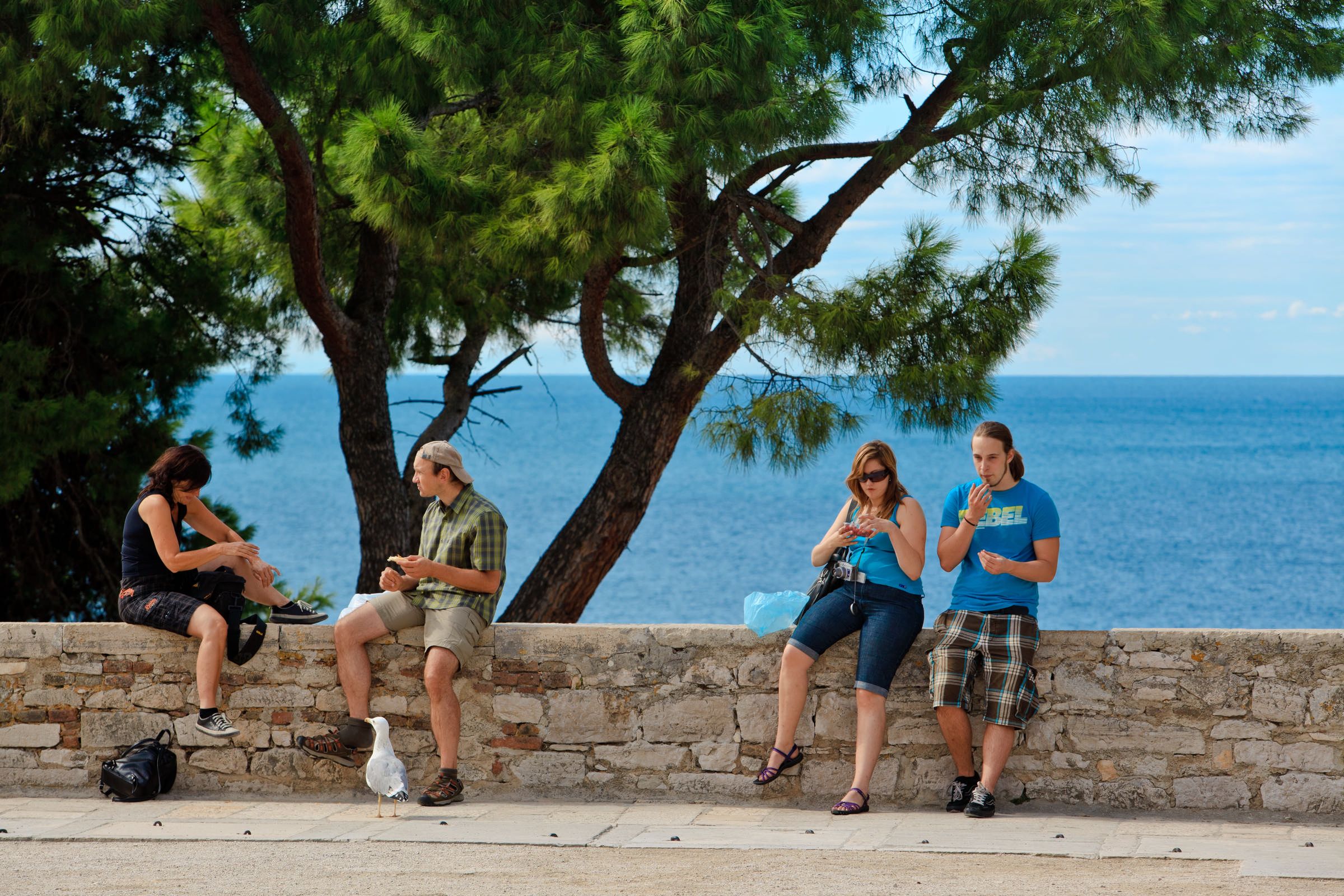
Prople in Rovinj, Istria / Copyright Romulić and Stojčić
Istrian mentality?
The director of the Istrian Tourist Board, Denis Ivošević, adds that Istrians are "organized, consistent and disciplined". And when that is the case, it doesn't bother two million tourists, or 250,000 of them a day during the summer, nor the thousands of Istrians who go to work in Italy or Slovenia every day. They are a real example that the new normal can be quite normal when things are arranged well.
"From the first day, we adhered to the prescribed measures. In Istria, it was difficult to see what was elsewhere on the coast, so tourists also complained that the waiters did not have masks. We immediately educated the employees on how to best protect themselves and their guests, and we also hired two people who only did disinfection. When the guests got up from the table, they would thoroughly disinfect everything every time," says the owner of the Pula tavern Boccaport Toni Draguzet and confirms that individual responsibility ultimately gives to the common good.
Sociologist Dražen Lalić does not deny that the mentality also has an influence.
"I don't like divisions by character. I am especially repulsed when the Dalmatian mentality is blamed for the spread of the infection in Split, and when the infection spreads in Zagreb, then the mentality is no longer mentioned. However, it is true, for example, that the half of Split that does not engage in tourism in the summer necessarily complains that there are too many tourists in the city. In Poreč or Rovinj, that is unthinkable," says Lalić, who blames inconsistencies around measures and the fact that some civil protection headquarters are run by insufficiently professional people for the bad epidemiological picture in most parts of Croatia.
For the latest travel info, bookmark our main travel info article, which is updated daily.
Read the Croatian Travel Update in your language - now available in 24 languages.
After the Visa, Jan de Jong Announces Croatian Digital Nomad Association
October 17, 2020 - Having pioneered the digital nomad visa in Croatia, Dutch entrepreneur Jan de Jong announces plans for a Croatia Digital Nomad Association.
One of the secrets of a happy life in Croatia, I have discovered over the years, is to surround yourself with positive people. With mass emigration, a generally negative media, and complaining in cafes an Olympic sport, it is easy to get sucked into a vortex of negativity. Surround yourself with positive 'can do' people, however, and Croatia looks an altogether different place - a country where its famed lifestyle is matched by positive entrepreneurs bringing positive change to this country.
Two of my favourite beacons of positivity, Tanja Polegubic and Jan de Jong, are down here with me in Dubrovnik at the moment, both playing key roles in the first-ever digital nomad conference in Croatia. Quite by chance (or was it?), both featured in an article I wrote back in May called What Happens in Croatia When Mindset Goes from Default Negative to Opportunity Positive?
Both have been very active since then in the push to promote the huge digital nomad opportunity in Croatia. Dutchman de Jong has spearheaded the initiative for the Croatian digital nomad visa, which was endorsed by Prime Minister Andrej Plenkoviic and looks set to become a reality in the first quarter of 2021, with Australian returnee Polegubic has been leading the coworking and remote work agenda in Croatia with her Saltwater coworking business. Part of her digital nomad vision for Croatia resulted in the Dubrovnik for Digital Nomads conference which kicked off in the former quarantine complex of Lazareti, just outside Dubrovnik's famous walls, last night.
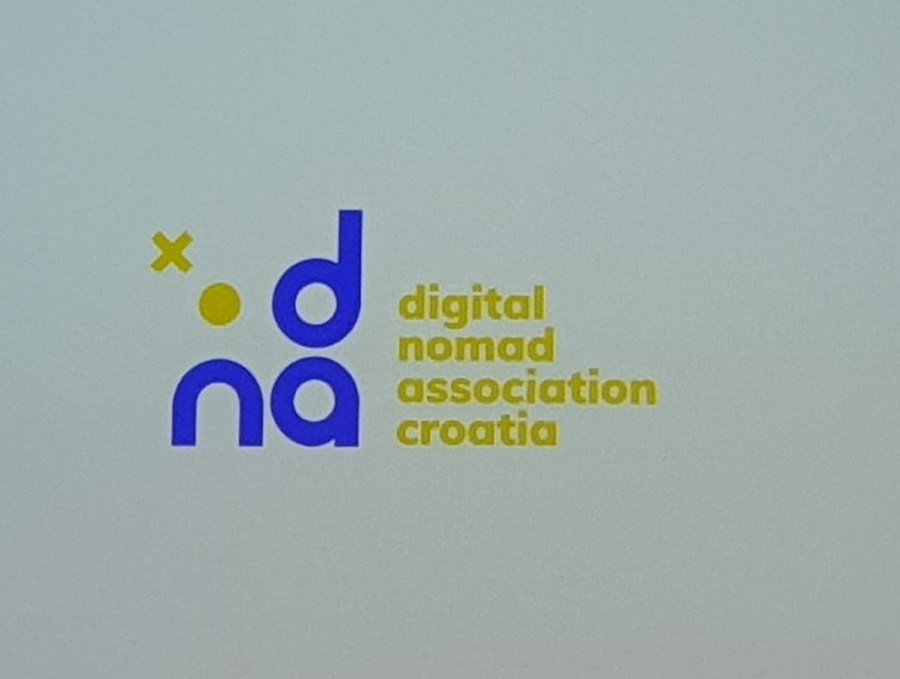
De Jong gave an update on the visa progress during his keynote speech at the conference, as well as answering the many questions that came his way both from the live audience and the global online Zoom audience. Discussions within the ministries are ongoing, but there is an urgency to wrap all the legislation by the end of the year, and de Jong expects the visa to become a reality during the first quarter of 2021. One of the tax architects of the Estonian digital nomad visa - the first in the world and currently the only one in Europe - is also helping the Croatian authorities with the discussions.
Although the visa was expected to dominate de Jong's presentation, the Dutchman had an announcement to make - the imminent launch of the Croatian Digital Nomad Association, which he is co-founding with Polegubic and Karmela Tancabel.
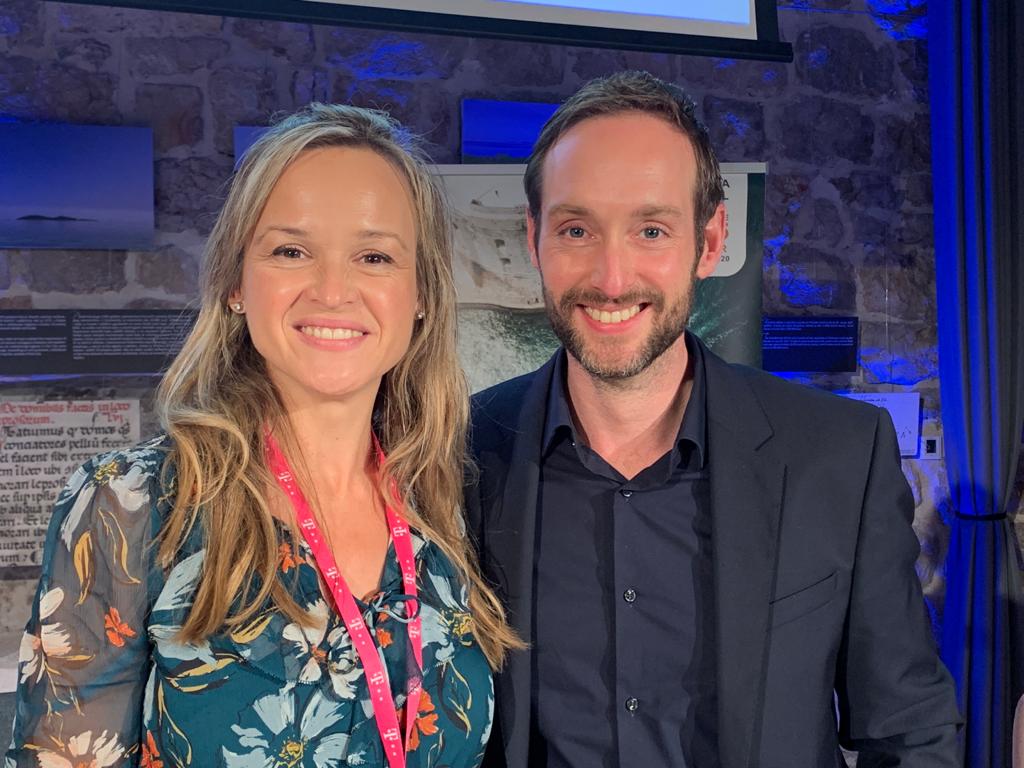
The new digital nomad association will be an excellent addition to Croatia's emerging nomad scene, and with some of its most influential advocates the founders, it starts with a lot of credibility.
The new association has five key aims:
- Information - the new association website, soon to be launched, will be a hub of information for all digital nomad related issues and services.
- Accreditation and certification - the association will work with Croatian businesses which want to offer their services to digital nomads with the introduction of an accreditation and certification scheme. Accommodation providers, for example, will sign up to a code of conduct protecting nomads from sudden hikes in accommodation prices for the tourist season.
- Education - the association will also be engaged in organising events around Croatia promoting the digital nomad agenda. One of the benefits of progressive digital nomads entering Croatian communities is the opportunity to give something back, and the potential to positively impact the Croatian mindset through nomad presentations and seminars in Croatian schools and universities is particularly exciting.
- Community - lifestyle means social life and community for the majority, and the association will be focused on building up a diverse and accessible community for incoming nomads.
- Representation - this new digital nomad initiative is a new venture for Croatia, and there will inevitably be problems and frustrations on the road ahead. The Croatian Digital Nomad Association aims to be a bridge between the authorities and the nomad community to iron out problems and bottlenecks. With de Jong's access to the decision makers who are shaping the digital nomad visa - and their responsiveness to his requests - should prove a useful mechanism to ensure a smoother experience all round.
The association website is currently under construction and will be launched shorted. Stay tuned to the dedicated TCN digital nomad news section for the latest updates.
Read more from the Dubrovnik for Digital Nomads conference - "Croatia Has the Potential To Be World's Number 1 Digital Nomad Destination"


